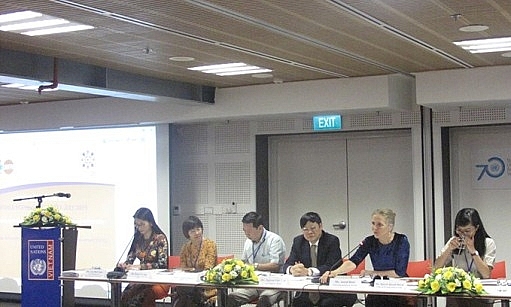World Population Day 2019: More challenges ahead
 |
| Experts and officials discussed success and challenges ahead |
At the International Conference on Population and Development (ICPD) in Cairo, what began as a discussion about population targets shifted and put the needs and aspirations of human beings at the centre of sustainable development. With this paradigm shift, 179 governments, including Vietnam, adopted the visionary Programme of Action and agreed that putting people first, empowering women, and enabling people to freely decide the timing and spacing of their pregnancies would clear the way to sustainable development.
The gains made since then are remarkable:
● In 1994, only about 15 per cent of married women in the least developed countries used a modern contraceptive. Today, 37 per cent do.
● 25 years ago in the least-developed countries, nearly 800 in 100,000 women died during pregnancy or childbirth. Today, that rate has been cut in half.
● A woman in a least-developed country 25 years ago had nearly six children. Today she has fewer than four.
Despite this success, we still have a long way to go before we can claim to have lived up to the commitments pledged in Cairo, towards achieving the 2030 Agenda for Sustainable Development.
There are still 214 million women who want to prevent a pregnancy but are not using a modern method of contraception. Every day, more than 800 women die from preventable causes during pregnancy and childbirth. Untold millions of women affected by war or disaster are cut off from services to prevent pregnancy or deliver safely.
Much more must be done to tear down the barriers that prevent women, men, and couples from fully exercising their reproductive rights.
Since 2016, Vietnam, along with the rest of the world, has embarked on the 2030 Agenda for Sustainable Development, underpinned by the 17 Sustainable Development Goals. The Agenda and its Goals seek to achieve a life of dignity for all, in order to truly leave no one behind.
The UNFPA has embarked on a new Strategic Plan, which supports the 2030 Agenda and strengthens our commitment to the ICPD Programme of Action. The UNFPA has proudly committed to three transformative results by 2030:
• Zero maternal deaths;
• Zero unmet need for family planning; and
• Zero gender-based violence and harmful practices against women and girls.
Addressing the World Population Day Celebration held at the Green One UN House in Hanoi, Astrid Bant, UNFPA Representative in Vietnam, said, “As we mark 25 years since the ICPD, we at the UNFPA are also celebrating our 50th anniversary. These milestones offer a collective opportunity to recommit to ensuring that everyone everywhere reaps the benefits of this transformative agenda, the implementation of which is essential for accelerating progress across the SDGs.”
Nguyen Viet Tien, Deputy Minister of Health, said, “In our vision, SDG goals and targets will not be fully achieved without holistic and comprehensive responses to universal human rights and equality, sexual and reproductive health and rights, youth development, gender equality, the empowerment of women, education, security, employment opportunities, economic growth, and of course, the dignity of all people.”
The Deputy Minister of Health confirmed Vietnam’s commitment to accelerating the implementation of the ICPD Programme of Action and SDGs.
This November, governments, advocates, health organisations, women’s and youth activists, and others will gather in Kenya for the Nairobi Summit. There, they will seek clear commitments that will advance the goals of the ICPD and secure the rights and dignity of all.
This November, the UNFPA is convening at the Nairobi Summit on ICPD25, co-sponsored by Kenya and Denmark, the UNFPA, and Ministry of Health in Vietnam, calling for additional commitments to complete the unfinished business of ICPD – to help ensure no one is left behind in achieving sexual and reproductive health and rights for all.
The International Conference on Population and Development is a 1994 meeting in Cairo where 179 governments adopted a revolutionary Programme of Action and called for women’s reproductive health and rights to take centre stage in national and global development efforts.
Specifically, the Programme of Action called for all people to have access to comprehensive reproductive healthcare, including voluntary family planning, safe pregnancy and childbirth services, and the prevention and treatment of sexually transmitted infections.
It also recognised that reproductive health and women’s empowerment are intertwined and that both are necessary for the advancement of society.
What the stars mean:
★ Poor ★ ★ Promising ★★★ Good ★★★★ Very good ★★★★★ Exceptional
 Tag:
Tag:
Related Contents
Latest News
More News
- Russian President congratulates Vietnamese Party leader during phone talks (January 25, 2026 | 09:58)
- Worldwide congratulations underscore confidence in Vietnam’s 14th Party Congress (January 23, 2026 | 09:02)
- Political parties, organisations, int’l friends send congratulations to 14th National Party Congress (January 22, 2026 | 09:33)
- 14th National Party Congress: Japanese media highlight Vietnam’s growth targets (January 21, 2026 | 09:46)
- 14th National Party Congress: Driving force for Vietnam to continue renewal, innovation, breakthroughs (January 21, 2026 | 09:42)
- Vietnam remains spiritual support for progressive forces: Colombian party leader (January 21, 2026 | 08:00)
- Int'l media provides large coverage of 14th National Party Congress's first working day (January 20, 2026 | 09:09)
- Vietnamese firms win top honours at ASEAN Digital Awards (January 16, 2026 | 16:45)
- ASEAN Digital Ministers' Meeting opens in Hanoi (January 15, 2026 | 15:33)
- ASEAN economies move up the global chip value chain (December 09, 2025 | 13:32)






















 Mobile Version
Mobile Version